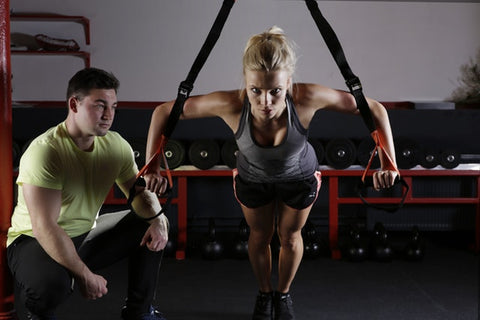If you are the type of person who has tried countless times to join a gym and get healthy for good, yet time and time again you find yourself failing to stick with it for much more than a couple weeks, you are not alone. In fact, it is more common that people fail at their fitness-related goals at least once in their life, if not every time. Perhaps there is a key step that you are missing. If you found out that you could reach your goals at a faster pace and with a higher success rate and it only required one simple tweak to what you've already been doing, would you believe me? Let's talk about how you can boost your fitness success simply by finding yourself an accountability partner.

What is an Accountability Partner?
An accountability partner is a person who will help you identify exactly what goal/goals you want to accomplish, verify the steps you need to take in order to achieve these goals, and most importantly, makes sure you stay on track while working to reach your goals. When you find someone that will be an accountability partner, together you will talk about your plans, get feedback, commit to taking action and have regular check-ins to make sure you’ve done what you said you’d do. Psychologically, if you feel like you have a responsibility and commitment toward another person, you are more likely to follow through on that commitment.
So, that million dollar question....How to choose your accountability partner?
Accountability partnerships come in many different forms and it also depends on what area of your life you are using this for. Did I mention that accountability partners don't just work in fitness-related areas but they can literally work for all areas of your life as long as you are trying to accomplish something. This can be health and fitness related, work related, financially related or even in overcoming an addiction.
Different Types of Accountability Partners
There is something known as the four layers of accountability. These include a coach, a team, a buddy, and your community or public accountability. These different options close off all "escape routes" by making yourself feel the pressure from all sides. Having all or a combination of these layers will improve your chances of success.
A coach is a mentor, boss, or expert who holds you to a higher standard than you may hold for yourself, therefore, they have higher expectations which can give you a confidence boost. For example, if you tell your boss in a team meeting that you are going to have a project done by the end of the week then you are a lot more likely to actually deliver because now there is an expectation.
Creating a team provides accountability because working with others requires you to deliver on your promises. If you work with a team, you are helping each other out by carrying your weight but also not wanting to let those people down by not following through on your agreed upon objectives.
You could also pair up with an accountability buddy, and have regular check-ins to assess progress and challenges. You will want to find someone with qualities you lack and vice versa. Remember, this is an accountability PARTNERSHIP and that means you’ll be giving back. Identify your strengths that might be helpful to your partner, and make sure you’re willing to provide constructive feedback, even when it's uncomfortable to share. Exercise partners provide a powerful combination of support, accountability, motivation and healthy competition. They play many roles including teammate, coach and cheerleader.
Lastly, consider publicly announcing your goal, even if it is on social media. Announcing a goal out loud makes it a reality rather than just a personal desire. When you make your goals public, you receive a combination of responses you can use to fuel your desire to succeed! If you don’t reach your goal, there is a social consequence. You can post your goal in a like-minded social media group or forum, on a public post, or in an email or in person to your friends and family. Announcing your goals to others puts you on the hook to execute.
If reaching your fitness goals is as simple as finding an accountability partner, then why don't more people do it?
There are many reasons. It could be that they don't feel comfortable asking someone to be their accountability partner, it could cost them money (in the case that they hire a coach), they find the idea of an accountability partner scary because it means that someone else will know and see firsthand what their flaws are, it means someone has to be brutally honest with them, or ultimately they just simply might not be ready to commit. But let's get real. Most of us have fallen off the workout wagon and let our healthy eating habits and nutrition slip more times than we'd like to admit. At some point we have to get brutally honest with ourselves and realize that if we make this (quite simple) change and found an accountability partner, we could have avoided this yo-yo health routine long ago.
To “be accountable,” all you need is a clear goal and a willingness to let others help you achieve it. That doesn't sound so bad, does it?! Real talk here. Goals are not easy to accomplish, particularly fitness-related goals. They take time, hard work, perseverance and the commitment to achieve. Furthermore, when it comes to fitness, results rarely come as quickly as you hope. It's easy (and, as we've mentioned, common) to lose motivation as you strive to attain your goals because, honestly, it can get pretty discouraging when you aren't seeing instant results and quitting means you are only letting yourself down. Besides, there's always next year, right? But it DOESN'T have to be this way. You will truly see an immediate change in your own mindset and performance level when you begin to leverage an accountability system.
Tools to Use with Your Accountability Partner
- Start a fitness journal and chart your successes
- Employ a food diary to document what you are eating and when
- Create a “rewards” program that allows you to “reward” yourself in a healthy way
Other Forms of Accountability
Here are some alternative options when it comes to less traditional accountability partners:
1. Have a gym partner. This could even just be someone you see frequently at the gym and exchanging numbers. Committing to meet someone at the gym pushes you to actually show up. All it takes is exchanging a simple text to engage the power of social expectations. A study by the Department of Kinesiology at Indiana University surveyed married couples who joined health clubs together and found that couples who worked out "on their own" had a 43 percent dropout rate over the course of a year versus a 6.3 percent rate for those who went together, regardless of whether they focused on the same type of exercise.

2. Find Fitbit friends- If you have a Fitbit, use it to connect and compete with friends and family and encouraging one another is a great way to stay motivated. Just the simple accountability of seeing other’s progress gives us incentive because it's a challenge. If you are competitive this will work especially well for you.
4. Exchange Texts. Particularly if you are someone who works out individually or does at-home sessions where you do a video or follow a specific fitness app, find someone who is interested in a similar fitness regimen and wants to try what you are implementing. Each morning, when you are done with your workout, text each other to check in. You are motivated because you don't want to be the one who skips out on the routine for the day.
5. Use an app or website to keep you accountable.
Accountability apps to try:
- stickK (www.stickk.com)- stickK was founded on the principle that creating incentives and assigning accountability are the two most important keys to achieving a goal. Stickk has you put money on the line and creating a Commitment Contract. You can add extra accountability by inviting friends and family to verify your reports and give you support along the way.
-
BodySpace (www.bodybuilding.com/superhuman)- a social fitness platform that offers you your personal training program, tracker and connets you with the largest online fitness community who love health and support your fitness journey.
-
DailyBurn (www.dailyburn.com/superhuman) Similar concept to BodySpace with 500,000 on DailyBurn who are tracking the results of their diet and exercise regimens. This app gives you over 1,000 workouts and a community to connect with to help keep you motivated.
Build an accountability plan into your next big goal, and see the difference it makes! If you want to improve your chances of success, use the power of accountability. What fitness goals are you going to achieve next?!
*** GUYS!! What do you think about the new and improved Pogamat site? Don't you love the ease of navigation and the clean sleek look?! Check out our AMAZING yoga mats here!
Leave a comment
Comments will be approved before showing up.
Also in Pogamat Blog

Prevent Workout Injuries with the Right Exercise Mat | Pogamat
Most workout injuries don’t come from pushing too hard — they come from training on the wrong surface. Learn how exercise mat injury prevention protects your joints, improves stability, and makes home workouts safer and more effective.

Buy Yoga Mats That Last: The Durability and Design of Pogamat



